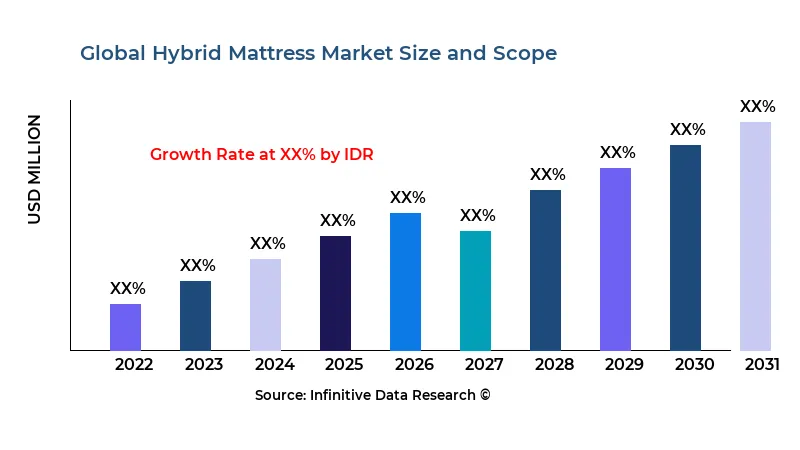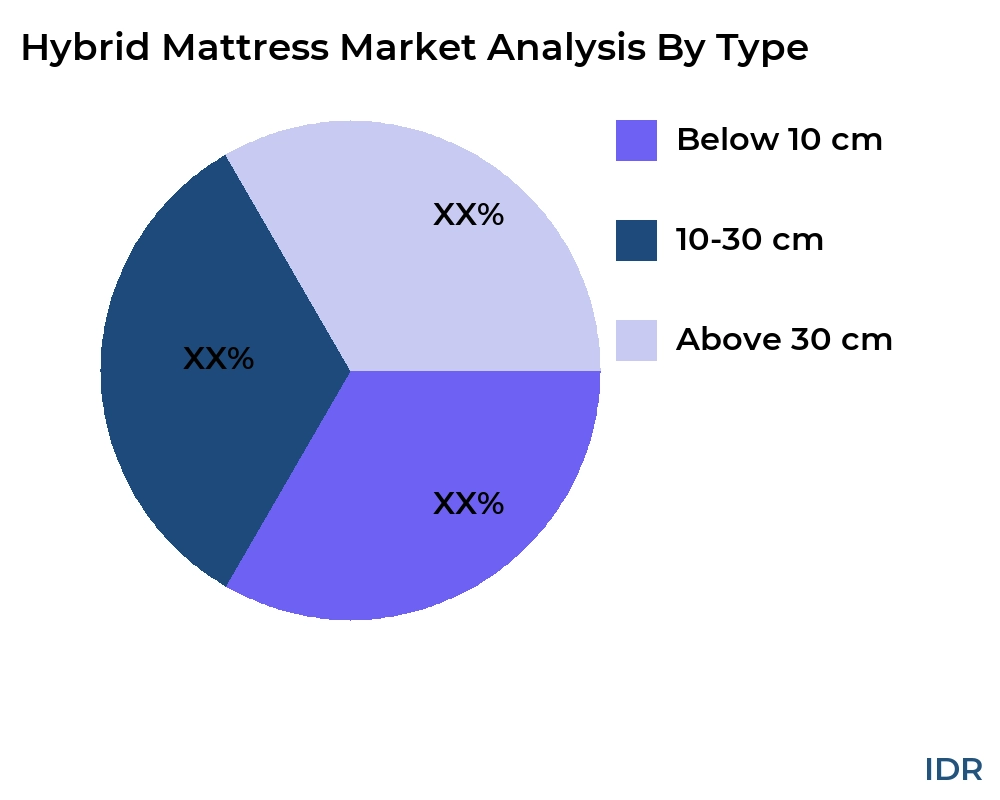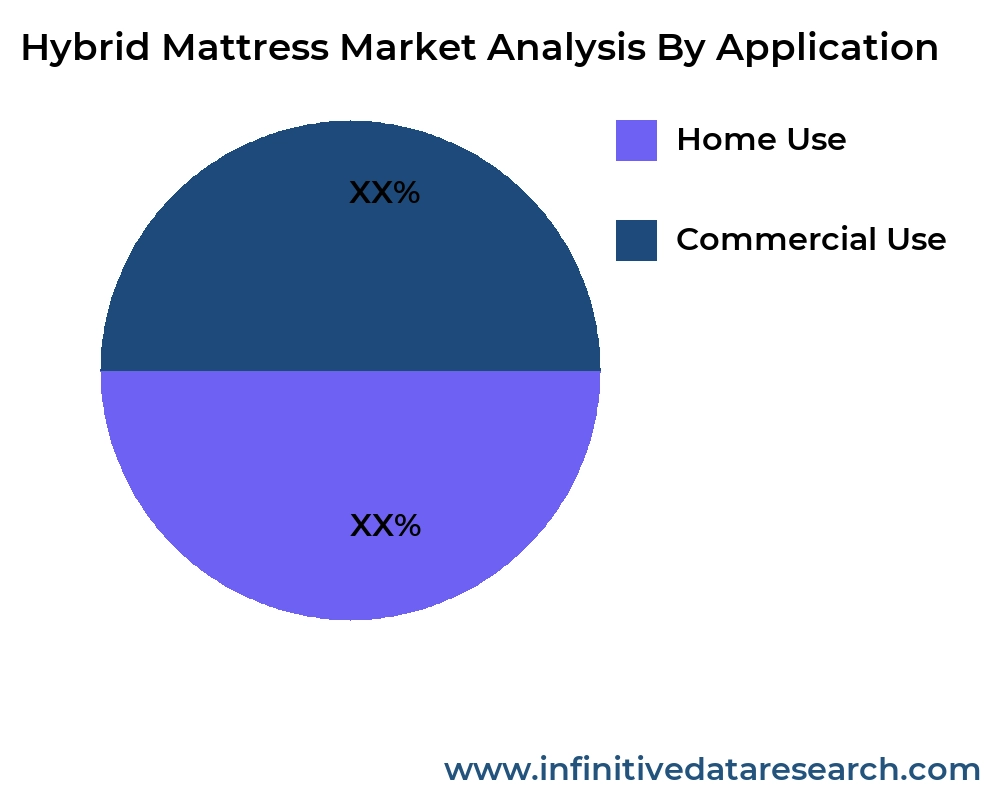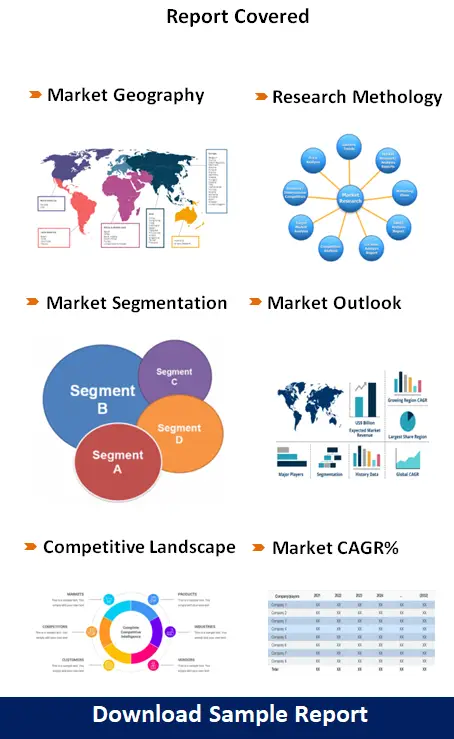Overview
The global hybrid mattress market report from 2024 to 2032 offers a detailed examination of the market's size, historical and projected growth, revenue share, current and emerging trends, investment strategies, and business expansions. The global hybrid mattress market is an ever-evolving landscape, reflecting the dynamic interplay of technological advancements, consumer preferences, and economic forces. The report delves into key growth factors such as import/export activities, product manufacturing, technological innovations, supply chain dynamics, and marketing networks. The hybrid mattress market was valued at US$ XXX.XX million in 2023 and is expected to reach US$ XXX.XX million by 2032, showcasing a robust CAGR throughout the forecast period.
This report aims to provide businesses with strategic insights and a solid contingency plan for operating within the hybrid mattress market. It includes concise information on market standing and long-term objectives to assist new businesses in planning effectively. Additionally, the report explores applications and consumers utilizing the services offered by the hybrid mattress market.

>>> Understand The Key Trends Shaping This Market:- Download PDF Sample
Market Segmentation
The study meticulously examines the hybrid mattress market based on various segments, including manufacturers, type, application, region, and country. This segmentation allows for a detailed understanding of market dynamics and aids in identifying growth opportunities.
By manufacturers, the market is characterized by a diverse range of players, each contributing uniquely to the competitive landscape. Key players include Tempur Sealy, known for its innovative product range and strong market presence; Mlily, which specializes in Consumer Goods technologies and boasts a significant global footprint; and Serta, which focuses on high-quality manufacturing processes and customer-centric solutions same analysis for remaining players we will discuss.
In terms of product type, the hybrid mattress market offers a variety of options catering to different consumer needs and preferences. Key product types include Below 10 cm, widely recognized for its reliability and efficiency in Consumer Goods; 10-30 cm, celebrated for its advanced features and superior performance; and Type 3, popular due to its cost-effectiveness and versatility same analysis for remaining type we will be discuss.
The market also caters to a broad spectrum of applications, ensuring its relevance across different sectors. Key applications include Home Use, extensively utilized in industrial settings for its robustness; Commercial Use, preferred in Consumer Goods environments and Application 3, commonly found in Consumer Goods areas due to its affordability and ease of use, same analysis for remaining application we will discuss.
Geographically, the segmentation provides insights into regional market dynamics by considering political, economic, geographical, and social influences. This comprehensive approach helps identify regional growth opportunities and challenges, ensuring a nuanced understanding of the market across North America, Europe, Asia-Pacific, Latin America, and the Middle East & Africa. Each region presents unique market dynamics, driven by factors such as technological adoption, regulatory frameworks, economic conditions, and consumer preferences, which collectively shape the global landscape of the hybrid mattress market.
Market Analysis By Competitors
- Tempur Sealy
- Mlily
- Serta
- Simmons
- Sleemon
- Sinomax
- Corsicana Bedding
- Kingsdown
- Restonic
By Product Type
- Below 10 cm
- 10-30 cm
- Above 30 cm
By Application
- Home Use
- Commercial Use
>>> Understand The Key Trends Shaping This Market:- Understand The Key Trends Shaping This Market:-
Research Methodology
The market size and growth projections are determined by analyzing the revenue generated by leading companies in the hybrid mattress industry. Our research methodology combines primary and secondary research supported by industry specialists. The analysis involves 81 to 84% primary research and 13 to 16% secondary research. Primary research includes interviews with key executives such as VPs, CEOs, Marketing Directors, and Business Development Managers from major market participants. This ensures accuracy and reliability in our data.
| REPORT ATTRIBUTES | DETAILS |
|---|---|
| Study Period |
2020-2033 |
| Base Year |
2024 |
| Forecast Period |
2025-2033 |
| Historical Period |
2020-2024 |
| Unit |
Value (USD Billion) |
| Key Companies Profiled |
Tempur Sealy, Mlily, Serta, Simmons, Sleemon, Sinomax, Corsicana Bedding, Kingsdown, Restonic |
| Segments Covered |
By Product |
| Customization Scope |
Free report customization (equivalent to up to 3 analyst working days) with purchase. Addition or alteration to country, regional and segment scope |
>>> Overview of Market Analysis:- Download PDF Sample
Competitive Landscape
The competitive landscape of the hybrid mattress market is characterized by the presence of key players who have created a diverse and dynamic market environment. The report provides detailed information on the primary competitors and their regional footprints. It describes how the market adapts to continuous change and how consumers respond to these changes. Key aspects of the competitive landscape include:
- Collaborations and Partnerships: Companies are forming strategic collaborations and partnerships to enhance their market presence and expand their product offerings.
- Mergers and Acquisitions: Mergers and acquisitions are common strategies employed by companies to strengthen their market position and achieve growth.
- Innovative Product Developments: hybrid mattress market Companies are focusing on developing innovative products to meet the evolving needs of consumers and stay ahead of the competition.
- Market Positioning: Companies are strategically positioning themselves in the market by leveraging their strengths and addressing market challenges.
global Hybrid Mattress market revenue (usd million) comparison by players 2025-2033
| Company/players | 2021 | 2022 | 2023 | 2024 | ... | (2032) |
|---|---|---|---|---|---|---|
| Tempur Sealy | XX | XX | XX | XX | XX | XX |
| Mlily | XX | XX | XX | XX | XX | XX |
| Serta | XX | XX | XX | XX | XX | XX |
| Simmons | XX | XX | XX | XX | XX | XX |
| Sleemon | XX | XX | XX | XX | XX | XX |
| Sinomax | XX | XX | XX | XX | XX | XX |
| Corsicana Bedding | XX | XX | XX | XX | XX | XX |
| Kingsdown | XX | XX | XX | XX | XX | XX |
| Restonic | XX | XX | XX | XX | XX | XX |
| Total | XX | XX | XX | XX | XX | XX |
global Hybrid Mattress market revenue (usd million) comparison by product type 2025-2033
Product Type
2023
2024
...
2032
CAGR%(2024-32)
Below 10 cm
XX
XX
XX
XX
XX
10-30 cm
XX
XX
XX
XX
XX
Above 30 cm
XX
XX
XX
XX
XX
Total
XX
XX
XX
XX
XX
| Product Type | 2023 | 2024 | ... | 2032 | CAGR%(2024-32) |
|---|---|---|---|---|---|
| Below 10 cm | XX | XX | XX | XX | XX |
| 10-30 cm | XX | XX | XX | XX | XX |
| Above 30 cm | XX | XX | XX | XX | XX |
| Total | XX | XX | XX | XX | XX |
global Hybrid Mattress market revenue (usd million) comparison by application 2025-2033
Application
2023
2024
...
2032
CAGR%(2024-32)
Home Use
XX
XX
XX
XX
XX
Commercial Use
XX
XX
XX
XX
XX
Total
XX
XX
XX
XX
XX
| Application | 2023 | 2024 | ... | 2032 | CAGR%(2024-32) |
|---|---|---|---|---|---|
| Home Use | XX | XX | XX | XX | XX |
| Commercial Use | XX | XX | XX | XX | XX |
| Total | XX | XX | XX | XX | XX |
>>> Market Understand Through Graph And Chart:- Download PDF Sample


Market Dynamics
The hybrid mattress market is influenced by various dynamic factors that shape its growth and development. These factors include market trends, growth drivers, restraining factors, and regional insights.
Market Trends
- Technological Advancements: The integration of AI and IoT technologies has revolutionized the hybrid mattress market, leading to improved efficiency, enhanced performance, and cost-effectiveness.
- Sustainability and Green Technologies: There is a growing emphasis on eco-friendly products and sustainable practices, driven by regulatory requirements and consumer preferences.
- Customization and Personalization: Manufacturers are focusing on offering customized solutions to meet specific consumer needs, enhancing user experience and satisfaction.
- Digital Transformation: The adoption of digital tools and platforms is streamlining operations, improving supply chain management, and enhancing customer engagement.
Market Growth Factors
- Increasing Demand: The rising demand for hybrid mattress products and services across various sectors is a significant growth driver.
- Technological Innovations: Continuous advancements in technology are enabling the development of innovative products, driving market growth.
- Government Investments: Investments in urbanization and infrastructure development by governments worldwide are supporting market expansion.
- Globalization of Business: The globalization of business activities is leading to increased demand for hybrid mattress products and services, creating new market opportunities.
Restraining Factors
- Regulatory Challenges: Compliance with stringent regulatory requirements can be challenging for manufacturers, affecting market growth.
- High Initial Investment Costs: The high cost of initial investments in technology and infrastructure can be a barrier for new entrants.
- Economic Uncertainty: Economic fluctuations and uncertainties can impact market stability and growth prospects.
Report Coverage
The report covers all relevant information influencing the development of the hybrid mattress industry. It includes company portfolios, growth opportunities, obstacles, and strategic plans. The objective is to provide businesses with multiple strategies and a solid contingency plan for the hybrid mattress business. The report also offers insights into market size, market share, and the significance of their global market presence.
Report Coverage
The report covers all relevant information influencing the development of the hybrid mattress industry. It includes company portfolios, growth opportunities, obstacles, and strategic plans. The objective is to provide businesses with multiple strategies and a solid contingency plan for the hybrid mattress business. The report also offers insights into market size, market share, and the significance of their global market presence.
The report provides a detailed analysis of the hybrid mattress market across various regions, highlighting the unique market dynamics and growth opportunities in each region.
- US
- Canada
- Mexico
- UK
- Germany
- France
- Italy
- Russia
- Spain
- Switzerland
- Austria
- Belgium
- Rest of Europe
- China
- Japan
- South Korea
- Indonesia
- Vietnam
- Philippines
- Australia
- Thailand
- Singapore
- Rest of APAC
- UAE
- Saudi Arabia
- Egypt
- South Africa
- Israel
- Rest of MEA
- Brazil
- Argentina
- Rest of Latin America
>>> Need A Different Region Or Segment? Download PDF Sample
Key Takeaways
- The global hybrid mattress market is expected to grow significantly from 2024 to 2032, driven by technological advancements, increasing demand, and government investments in urbanization.
- The market is characterized by a diverse range of manufacturers, product types, and applications, catering to different consumer needs and preferences.
- Regional insights highlight the unique market dynamics and growth opportunities in various regions, including North America, Europe, Asia-Pacific, Latin America, and the Middle East & Africa.
- The competitive landscape features key players who have created a dynamic and diverse market environment through collaborations, mergers and acquisitions, and innovative product developments.
- Market trends such as technological advancements, sustainability, customization, and digital transformation are shaping the growth and development of the hybrid mattress market.
- Despite the positive outlook, the market faces challenges such as regulatory compliance, high initial investment costs, and economic uncertainties.
- The report provides comprehensive coverage of market size, market share, growth factors, and strategic insights to help businesses navigate the dynamic hybrid mattress market and achieve long-term success.
By leveraging the information provided in this report, businesses can develop effective strategies, address market challenges, and capitalize on growth opportunities to ensure sustainable growth and long-term success in the global hybrid mattress market.
- Introduction
- Objectives of the Study
- Market Definition
- Research Scope
- Currency
- Key Target Audience
- Research Methodology and Assumptions
- Executive Summary
- Premium Insights
- Porter’s Five Forces Analysis
- Value Chain Analysis
- Top Investment Pockets
- Industry Trends
- Market Dynamics
- Market Evaluation
- Drivers
- Restraints
- Opportunities
- Challenges
- Global Hybrid Mattress Market Analysis and Projection, By Companies
- Segment Overview
- Tempur Sealy
- Mlily
- Serta
- Simmons
- Sleemon
- Sinomax
- Corsicana Bedding
- Kingsdown
- Restonic
- Global Hybrid Mattress Market Analysis and Projection, By Type
- Segment Overview
- Below 10 cm
- 10-30 cm
- Above 30 cm
- Global Hybrid Mattress Market Analysis and Projection, By Application
- Segment Overview
- Home Use
- Commercial Use
- Global Hybrid Mattress Market Analysis and Projection, By Regional Analysis
- North America
- US
- Canada
- Mexico
- Europe
- UK
- Germany
- France
- Italy
- Russia
- Spain
- Switzerland
- Austria
- Belgium
- Rest of Europe
- Asia Pacific
- China
- Japan
- South Korea
- Indonesia
- Vietnam
- Philippines
- Australia
- Thailand
- Singapore
- Rest of APAC
- Middle East
- UAE
- Saudi Arabia
- Egypt
- South Africa
- Israel
- Rest of MEA
- Latin America
- Brazil
- Argentina
- Rest of Latin America
- Global Hybrid Mattress Market-Competitive Landscape
- Overview
- Market Share of Key Players in the Hybrid Mattress Market
- Global Company Market Share
- North America Company Market Share
- Europe Company Market Share
- APAC Company Market Share
- Competitive Situations and Trends
- Coverage Launches and Developments
- Partnerships, Collaborations, and Agreements
- Mergers & Acquisitions
- Expansions
- Company Profiles
- Tempur Sealy
- Business Overview
- Company Snapshot
- Company Market Share Analysis
- Company Coverage Portfolio
- Recent Developments
- SWOT Analysis
- Mlily
- Business Overview
- Company Snapshot
- Company Market Share Analysis
- Company Coverage Portfolio
- Recent Developments
- SWOT Analysis
- Serta
- Business Overview
- Company Snapshot
- Company Market Share Analysis
- Company Coverage Portfolio
- Recent Developments
- SWOT Analysis
- Simmons
- Business Overview
- Company Snapshot
- Company Market Share Analysis
- Company Coverage Portfolio
- Recent Developments
- SWOT Analysis
- Sleemon
- Business Overview
- Company Snapshot
- Company Market Share Analysis
- Company Coverage Portfolio
- Recent Developments
- SWOT Analysis
- Sinomax
- Business Overview
- Company Snapshot
- Company Market Share Analysis
- Company Coverage Portfolio
- Recent Developments
- SWOT Analysis
- Corsicana Bedding
- Business Overview
- Company Snapshot
- Company Market Share Analysis
- Company Coverage Portfolio
- Recent Developments
- SWOT Analysis
- Kingsdown
- Business Overview
- Company Snapshot
- Company Market Share Analysis
- Company Coverage Portfolio
- Recent Developments
- SWOT Analysis
- Restonic
- Business Overview
- Company Snapshot
- Company Market Share Analysis
- Company Coverage Portfolio
- Recent Developments
- SWOT Analysis
List of Table
- Drivers of Global Hybrid Mattress Market: Impact Analysis
- Restraints of Global Hybrid Mattress Market: Impact Analysis
- Global Hybrid Mattress Market, By Technology, 2023-2032(USD Billion)
- global Below 10 cm, Hybrid Mattress Market, By Region, 2023-2032(USD Billion)
- global 10-30 cm, Hybrid Mattress Market, By Region, 2023-2032(USD Billion)
- global Above 30 cm, Hybrid Mattress Market, By Region, 2023-2032(USD Billion)
- global Home Use, Hybrid Mattress Market, By Region, 2023-2032(USD Billion)
- global Commercial Use, Hybrid Mattress Market, By Region, 2023-2032(USD Billion)
List of Figures
- Global Hybrid Mattress Market Segmentation
- Hybrid Mattress Market: Research Methodology
- Market Size Estimation Methodology: Bottom-Up Approach
- Market Size Estimation Methodology: Top-down Approach
- Data Triangulation
- Porter’s Five Forces Analysis
- Value Chain Analysis
- Top investment pocket in the Hybrid Mattress Market
- Top Winning Strategies, 2023-2032
- Top Winning Strategies, By Development, 2023-2032(%)
- Top Winning Strategies, By Company, 2023-2032
- Moderate Bargaining power of Buyers
- Moderate Bargaining power of Suppliers
- Moderate Bargaining power of New Entrants
- Low threat of Substitution
- High Competitive Rivalry
- Restraint and Drivers: Hybrid Mattress Market
- Hybrid Mattress Market Segmentation, By Technology
- Hybrid Mattress Market For Live Attenuated, By Region, 2023-2033 ($ Billion)
- Global Hybrid Mattress Market, By Technology, 2023-2032(USD Billion)
- global Below 10 cm, Hybrid Mattress Market, By Region, 2023-2032(USD Billion)
- global 10-30 cm, Hybrid Mattress Market, By Region, 2023-2032(USD Billion)
- global Above 30 cm, Hybrid Mattress Market, By Region, 2023-2032(USD Billion)
- global Home Use, Hybrid Mattress Market, By Region, 2023-2032(USD Billion)
- global Commercial Use, Hybrid Mattress Market, By Region, 2023-2032(USD Billion)
- Tempur Sealy: Net Sales, 2023-2033 ($ Billion)
- Tempur Sealy: Revenue Share, By Segment, 2023 (%)
- Tempur Sealy: Revenue Share, By Region, 2023 (%)
- Mlily: Net Sales, 2023-2033 ($ Billion)
- Mlily: Revenue Share, By Segment, 2023 (%)
- Mlily: Revenue Share, By Region, 2023 (%)
- Serta: Net Sales, 2023-2033 ($ Billion)
- Serta: Revenue Share, By Segment, 2023 (%)
- Serta: Revenue Share, By Region, 2023 (%)
- Simmons: Net Sales, 2023-2033 ($ Billion)
- Simmons: Revenue Share, By Segment, 2023 (%)
- Simmons: Revenue Share, By Region, 2023 (%)
- Sleemon: Net Sales, 2023-2033 ($ Billion)
- Sleemon: Revenue Share, By Segment, 2023 (%)
- Sleemon: Revenue Share, By Region, 2023 (%)
- Sinomax: Net Sales, 2023-2033 ($ Billion)
- Sinomax: Revenue Share, By Segment, 2023 (%)
- Sinomax: Revenue Share, By Region, 2023 (%)
- Corsicana Bedding: Net Sales, 2023-2033 ($ Billion)
- Corsicana Bedding: Revenue Share, By Segment, 2023 (%)
- Corsicana Bedding: Revenue Share, By Region, 2023 (%)
- Kingsdown: Net Sales, 2023-2033 ($ Billion)
- Kingsdown: Revenue Share, By Segment, 2023 (%)
- Kingsdown: Revenue Share, By Region, 2023 (%)
- Restonic: Net Sales, 2023-2033 ($ Billion)
- Restonic: Revenue Share, By Segment, 2023 (%)
- Restonic: Revenue Share, By Region, 2023 (%)
Infinitive Data Research provides comprehensive market research, offering in-depth market analysis to help companies understand their target market and industry competition. This research predicts the market acceptance of your brand and products, ensuring informed decision-making for business success.
Competitor Analysis in the Hybrid Mattress Industry
Conducting a competitor analysis involves identifying competitors within the Hybrid Mattress industry and studying their various marketing strategies. This comparative data allows you to assess your company's strengths and weaknesses relative to competitors, providing insights to enhance your market position.
Importance of Continuous Market Research
Consistently conducting market research is essential for minimizing risk at every stage of business operations. Hybrid Mattress market research enables you to collect qualitative and quantitative data, which, when properly analyzed, leads to wise decisions that align with user and customer needs. Below are some crucial lessons learned through the Hybrid Mattress market research process:

Key Dimensions of Hybrid Mattress Market Analysis
- Trend and Pattern Identification: Analyzing data to spot market trends and patterns.
- Pricing Analysis: Assessing keyword pricing strategies.
- Actionable Insights: Implementing insights derived from data analysis.
- Market Potential: Evaluating the potential of the Hybrid Mattress market.
- Competitor Analysis: Studying competitors' strategies and performance.
- Location Analysis: Assessing optimal locations for market penetration.
- Distribution Channels Analysis: Evaluating the effectiveness of distribution channels.
- Market Size and Growth Rate: Measuring market size and growth potential.
- Market Profitability: Assessing profitability prospects.
- Key Success Factors: Identifying critical factors for success.
- Cost Structure: Understanding the cost structure within the Hybrid Mattress industry.
Target Audience for the Report
This report is valuable for a diverse audience, including:
- Hybrid Mattress Market Manufacturers: To understand market dynamics and enhance production strategies.
- Investors and Financing Companies: To assess investment opportunities and risks.
- Hybrid Mattress Market Suppliers: To identify market demands and supply chain efficiencies.
Necessity of the Report
Making Crucial Business Decisions
Understanding the Hybrid Mattress market, competition, and industry landscape is vital for making informed business decisions. Without current and relevant market research, decisions may be based on outdated or irrelevant information, potentially harming the business.
Securing Investment Funds
Attracting investors requires demonstrating thorough market research. Investors need assurance that you understand the sector, current and potential competition, and whether your idea addresses a market need.
Identifying New Business Opportunities
Hybrid Mattress market research goes beyond understanding trends and consumer behavior. It identifies new revenue streams and opportunities for business pivots. These insights can lead to strategic changes in the business model, promoting growth and adapting to market challenges.
Avoiding Business Failures
Market research also plays a crucial role in risk mitigation. It can reveal when not to pursue certain actions, saving the company from potential losses in revenue, brand image, and more. This proactive approach is often overlooked but is essential for long-term success.
Conclusion
Infinitive Data Research's comprehensive Hybrid Mattress market research provides critical insights for making solid business decisions, securing investments, identifying new opportunities, and avoiding potential failures. Understanding market dynamics through continuous research ensures your company remains competitive and thrives in the Hybrid Mattress industry.




